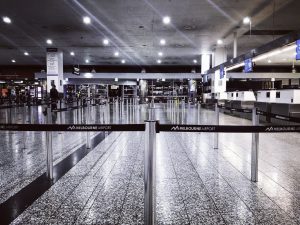Each afternoon during March and April of 2020, a large crowd would gather near my office in central Adelaide. A few hundred meters away, a food bank was buckling under unprecedented demand.
Usually catering for homeless and displaced families in inner Adelaide, the number of those in need of the food bank’s support had exploded as COVID-19 shut down the city’s economy.
The line, which snaked for over a hundred meters, was composed almost entirely of international students – mainly from India, Nepal and China – who had been excluded from any form of monetary support by the Australian Government, despite their residence in the country.
Prohibited from working because of widespread lockdowns, and with no access to any financial support, this community of foreign nationals had nowhere else to turn but the bread line.
Those images have stuck with me throughout the pandemic, serving as a constant reminder that, while Australia’s response to COVID-19 has been successful in containing the spread of the disease, it has been tainted by repeated moral failures.
The Australian Government, led by the 52-year-old conservative Scott Morrison, takes considerable pride in its efforts to contain COVID-19.
On the surface, the numbers speak for themselves: Australia has all but contained the virus. There has only been a single COVID-19 death in the country this year. And, for most Australians, normality has returned to daily life.
We were told early in the pandemic that “we’re all in this together”; that these achievements are ours, as Australians, to enjoy.
For the tens of thousands of Australian expatriates, the Government has a different message: you’re on your own.
This week, that approach reached its logical endpoint.
As India’s COVID-19 wave shocked the world, the Australian Government reacted by banning all inbound flights from the country, with no exceptions.
Then, citing unpublished medical advice, the Morrison Government – in a 1 am press release – took that policy a step further, announcing on Saturday that any Australian currently in India that manages to get home will face criminal punishment. The maximum penalty is 5 years in jail, and a US$50,000 fine.
It’s worth repeating: the Australian Government is imposing a criminal penalty on Australian citizens for entering their own country.
In defending the measure, Treasurer Josh Frydenberg argued it was necessary to “keep Australians safe.”
That simplistic argument insinuates, however, that the 9000 Australian citizens who remain in India are, in some way, less Australian than those that happen to live on the Australian continent – despite their possession of Australian passports.
The racialized overtones of this measure are impossible to ignore. During waves of COVID-19 in the United Kingdom, Europe, and in the United States, the Australian Government never considered a similar measure. Among Australia’s communities of color, this has been noted.
“One rule for people of color, another for white people,” wrote Neha Madhok, a director of Democracy in Colour, a leading racial justice advocacy group in Australia.
While unconscionable, this over-reach by Australia should not come as a surprise.
The formal criminalization of largely non-white Australian citizens returning to their homeland is the logical end point of a year of anti-expatriate mania that has spread virulently through Australia. And it comes after two decades in which the administration of the strongest possible border controls has served as a constant, ugly undercurrent in Australian political debate – but one that often wins elections.
At the beginning of the pandemic, Australian expatriates were told to “come home” by Scott Morrison. This simple dictate ignored the complex ways in which Australians, as a deeply multicultural and globalized citizenry, are connected to the world.
Many couldn’t simply quit jobs, or abandon children, and leave for Australia on a dime without imposing untold economic – and potentially health – risks on them and their families.
But in making this request, the Morrison Government placed all blame on Australian expatriates for being legally outside of their own country, and absolved itself of any responsibility in protecting them.
That decision created a COVID-19 culture in Australian in which Australian expatriates, despite their Australian citizenship, have been all but abandoned by their own government, and often pilloried by their compatriots for ever having left Australian soil.
Australia is a wealthy, powerful, sophisticated country. It has the 13th largest economy in the world.
But it continues to impose unprecedentedly cruel financial and logistical burdens on its own citizens who happen to have been overseas as the pandemic began.
The Morrison government led that charge, but it is not alone.
Queensland Premier Anastacia Palasczuk was the first to impose a $3,000 fee on all Australians returning home.
Many cheered on that measure. But I lamented, as a progressive Labor government effectively imposed a means-test on Australians returning to their own place of citizenship.
It was a measure that quickly spread through every jurisdiction in the country.
After promising to get Australians home by Christmas, the Morrison government did little to achieve that aim, and has ignored repeated calls to build quarantine facilities that would allow more Australians, irrespective of their ethnicity, to return home.
The reality is Australia is now governed by those who are so bereft of leadership and imagination that they find it easier to impose criminal sanctions on Indian-Australians returning home than funding and designing a more sophisticated approach to quarantine.
We began the pandemic in Australia by prohibiting international students in Australia from financial support. A year on, we are now at the point where predominately non-white Australians have been abandoned by their own government in the face of an unprecedented health crisis.
Australia can crow about its success in containing COVID-19. But the treatment of Australian expatriates, and the diverse communities of which they are often members, will serve as a dark chapter in the history of Australia’s COVID-19 response.

































